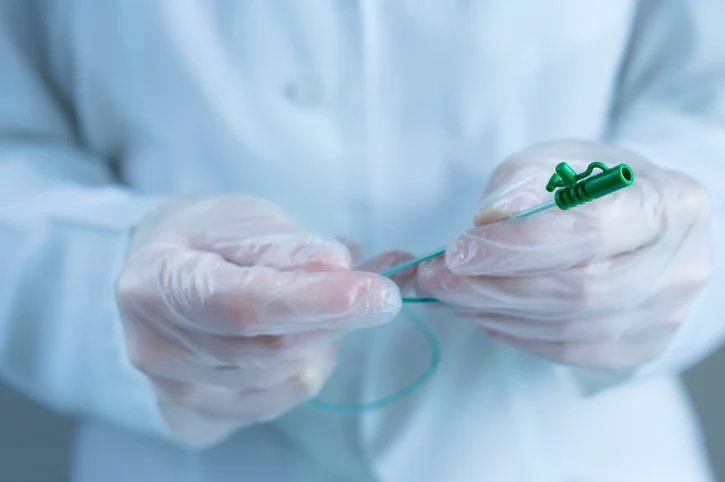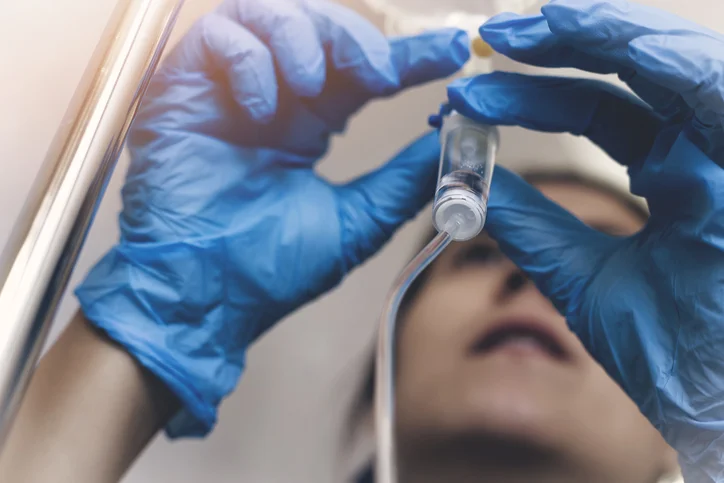Patients may be entitled to compensation for medical care by filing a Tivad Lawsuit, and we can help. Please click the button below for a Free Confidential Case Evaluation or call us toll-free 24 hrs/day by dialing (866) 588-0600.
TIVAD ports, also known as Port-a-Cath, have been the subject of hundreds of lawsuits filed across the U.S. The primary allegations against manufacturers claim these medical devices caused serious injuries including infections, sepsis, internal bleeding, heart damage, and even death.
The lawsuits allege that TIVAD ports made of silicone mixed with barium sulfate can weaken over time, causing the implanted ports to break or leak.
Table Of Contents
- Latest TIVAD Lawsuit Updates
- TIVAD Injuries & Side Effects
- Do You Qualify for a TIVAD Lawsuit?
- Statute of Limitations for TIVAD Lawsuits
- FAQs
- 1. What is a TIVAD totally implanted port?
- 2. Who typically needs a TIVAD port?
- 3. What’s the problem with TIVAD implantable ports?
- 4. What are the specific issues with Angioflow Power Ports?
- 5. What is catheter separation in TIVAD ports?
- 6. What are BioFlo Port flex fatigue issues?
- 7. Who is liable for TIVAD lawsuit claims?
- 8. Can I sue if I have been injured by a TIVAD?
- 9. Do I need a lawyer for a TIVAD lawsuit?
- 10. How can I get help with my TIVAD lawsuit?
- Get a Free TIVAD Lawsuit Evaluation With Our Lawyers
Latest TIVAD Lawsuit Updates
- October 2021 – A lawsuit was filed on behalf of a cancer patient who was injured after his TIVAD port broke and leaked chemotherapy medications into his body from the port implantation site. The complaint was filed by the family of Jesus L. III, who was implanted with an AngioDynamics Vortex Port in June 2019 at Texas Children’s Hospital in Houston for chemotherapy [1].
- June 2019 – Less than two weeks after receiving the totally implanted port, the patient had to undergo another surgery to remove the vortex port after the device failed. It was determined that the port was leaking chemotherapy medication under his skin around the port. In May 2021, Jesus L. III sadly died following complications with the device [2].
FDA Reports and Statistics
According to reports, the FDA approved the Vortex Port in December 2006 [3]. Shortly after approval, the manufacturers allegedly began receiving reports of the Vortex Port breaking after being implanted, with fractured pieces of the device migrating to other areas of the body, including the heart and lungs.
The FDA has received numerous reports of catheter fractures, dislodgement, and other complications associated with TIVAD devices. These reports highlight the potential risks of device failure and subsequent patient harm.
TIVAD Injuries & Side Effects
TIVAD ports have been linked to numerous life-threatening injuries and complications, including:
- Hemorrhage: Internal bleeding that can be life-threatening
- Cardiac complications: Including cardiac/pericardial tamponade (pressure around the heart) and cardiac arrhythmia
- Device failure: Breakage, leakage of medications and fluids into the body, septum dislodgements
- Infections: Including sepsis which can be fatal
- Tissue damage: Perforations of tissue, vessels, and organs, erosion through the skin, necrosis
- Cancer advancement: When the TIVAD breaks or leaks medication, which reduces the effectiveness of chemotherapy
- Severe complications: Requiring removal surgery or resulting in death
Do You Qualify for a TIVAD Lawsuit?
You may qualify for a TIVAD lawsuit if:
- You received a TIVAD port implantation.
- You experienced serious side effects including infections, sepsis, internal bleeding, heart damage, device breakage or leakage.
- The injuries required medical treatment or hospitalization.
- You can provide medical documentation linking your injuries to the TIVAD device.
Evidence Required for a TIVAD Lawsuit
To support your case, you will need:
- Medical records documenting your injuries
- Proof of the implantation procedure
- Records of device malfunctions
- Expert testimony linking the device to the complications
- Any communication with healthcare providers or regulatory authorities
Damages You Can Recover
Compensation from a TIVAD lawsuit may include:
- Medical expenses
- Lost wages
- Pain and suffering
- Other related costs depending on the severity of your injuries and their impact on your life
Statute of Limitations for TIVAD Lawsuits
The statute of limitations for filing a TIVAD lawsuit varies by state but typically ranges from one to three years from the date of injury or discovery of the defect.
Related Articles:
See all related medical device lawsuits our attorneys are currently taking.
FAQs
1. What is a TIVAD totally implanted port?
TIVAD stands for Totally Implantable Venous Access Device, also known as Port-A-Cath. These devices are placed under the skin and connected to a vein via a catheter, allowing healthcare providers to easily administer medicines and transfusions to patients.
2. Who typically needs a TIVAD port?
TIVAD ports are highly recommended for those who require regular access to a vein for medication and/or therapy. They are most often implanted in cancer patients who require radiation therapy for treatment, as well as patients who need regular blood transfusions, blood draws, repeated blood samples, frequent dressings, antibiotic treatments, or other IV treatments.
3. What’s the problem with TIVAD implantable ports?
TIVAD totally implanted ports are made of silicone mixed with barium sulfate, so they can be viewed on an X-ray. The problem is that barium sulfate can reduce the strength of silicone over time, which can cause the implanted ports to break or leak.
4. What are the specific issues with Angioflow Power Ports?
Lawsuits allege that the locking mechanism between the Angioflow Power Port and the catheter has been found to leak in many patients. The manufacturer was allegedly aware of a design defect in the Vortex port which caused a high incidence of failure of the locking mechanism that secures the catheter to the stem of the injection port.
5. What is catheter separation in TIVAD ports?
Due to the alleged defect, the Vortex port has an increased risk that the catheter will separate from the injection port, causing medication and administered fluids to leak into the tissue of the silicone injection port implantation site during blood transfusions.
6. What are BioFlo Port flex fatigue issues?
Catheter fractures occur mainly due to a reduction in durability due to constant flexing – also known as flex fatigue. When this happens, the catheter typically breaks into multiple pieces and is swept throughout the circulatory system, potentially reaching the heart and lungs.
7. Who is liable for TIVAD lawsuit claims?
In cases involving TIVAD injuries, it is usually the manufacturer who is held responsible. Lawsuits allege that manufacturers have failed to implement safety measures that could prevent degradation from occurring over time, possibly in an effort to maximize profits and reduce costs.
8. Can I sue if I have been injured by a TIVAD?
Yes, you can sue if you have been injured by a TIVAD. You will need to provide evidence linking your injuries to the defective device and demonstrate how it has impacted your health and life.
9. Do I need a lawyer for a TIVAD lawsuit?
It is highly recommended to consult a knowledgeable lawyer prior to filing a TIVAD lawsuit. These cases are typically considered product liability, and are incredibly difficult to litigate, requiring considerable experience to prevail successfully. A lawyer with experience in product liability cases can help perform all litigation on your behalf to ensure you receive maximum compensation.
10. How can I get help with my TIVAD lawsuit?
The Medical Device Litigation Group is an experienced team of trial lawyers that focus on the representation of plaintiffs in TIVAD lawsuits. They are handling individual litigation nationwide and currently accepting new potential injury and death cases on behalf of patients in all 50 states.
Get a Free TIVAD Lawsuit Evaluation With Our Lawyers
Time is limited to pursue legal action in TIVAD lawsuits, with statutes of limitations typically ranging from one to three years depending on your state. Don’t delay in seeking the justice and compensation you deserve.
Our services include:
- Free, confidential consultations
- No upfront costs or fees
- Payment only if we win your case
References
- https://www.leadingjustice.net/product-liability-lawsuits/port-a-cath/
- https://www.rwblawyers.com/practice-areas/implanted-ports
- https://www.accessdata.fda.gov/cdrh_docs/pdf6/K062414.pdf

 Published by
Published by 


